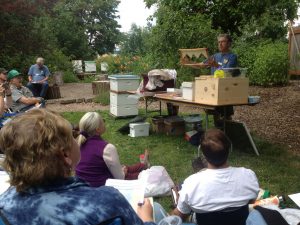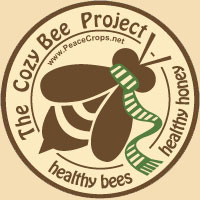As you probably know if you’ve been following this for any amount if time, I’m a beekeeper. I got into it right after returning from Peace Corps in 2010, and almost immediately I joined the Oregon Master Beekeeper program. It’s a great program: at the Apprentice level, they hook you up with a mentor to help you through your first year, set up classes you can attend, give you a really great introductory text on beekeeping, and they even have lab days where you can learn cool things like how to identify rare bee diseases and how to perform a bee autopsy with a dissection microscope. But the best part about the program is that it sets up a structured framework for learning, so that you can get a well-rounded bee knowledge and not miss anything important. Once you’ve done all that and filled out some paperwork, you are a certified Apprentice Beekeeper.
After that, you can continue your studies as a Journeyman. The program has lots of completion requirements, designed to expose you to a wide range of beekeeping topics… things like how to judge a honey competition, how to breed queens, organizing and managing a beekeeping seminar, running a local bee club, etc. As part of the program, you do guided studies on topics like hive design and configuration, chemical and organic medicines, parasite control, and more. You also have to manage bees for three years and keep fairly detailed observation logs. And, at the end, there is a pretty outrageous test that includes questions like “when honey crystallizes, it is due to an imbalance of which two sugar compounds?” and “Describe the effect of 9-Oxodec-2-enoic acid on a bee colony, and name at least three other pheromones use in bee communication.”
Really. I didn’t make that last part up. (glucose & fructose; and 9-ODA is “queen mandibular pheromone” and it keeps colonies from swarming, among other things)
The reason I’m telling you all of this is that last Saturday, I took the practical portion of the Journeyman exam at the Oregon State Honeybee Lab. A very experienced beekeeper and a PhD entomologist watched me open up a hive, work the bees, and tell them everything I could about what I was doing. Then, I went into the lab and analyzed some honey with a refractometer and (mis)identified a few bee diseases.
It might sound stressful, but it was actually a LOT OF FUN! I have been one of those nerds who likes test day ever since I was a kid. I enjoy the challenge of being tested, and I also love learning. And I sure did learn a lot on Saturday.
As you may have guessed, I wouldn’t be so excited about all of this if I hadn’t passed. But I did, so now I am a Journeyman beekeeper, patch and all. I’ve already registered for the last stage of the program, Master. The program leaders were excited to get my application, there are only a handful of Master-level students in the state right now. It’s a process that takes several years (I’m not in a hurry), and you are assigned a review committee much like if you were writing a dissertation. In fact, the program is in part patterned after a university masters degree program. Among other things I get to look forward to, I will be doing some peer-reviewed bee research, which should be super fun and is not something I’ve done before. I will also be starting a queen breeding program. More on that in the next few years.



One Response to Journeyman Beekeeper